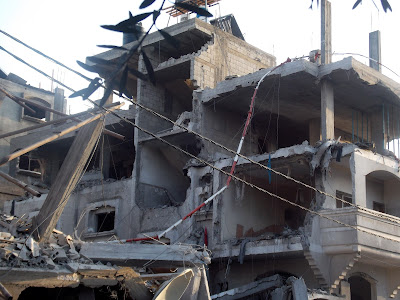We were very excited for Eid al-Fitr this year, which comes after we finish Ramadan, a month of fasting from sunrise to sunset. My little brother and sister bought their Eid clothes during the first week of Ramadan when the mad war had not yet started. They were waiting impatiently for Ramadan to end so they could wear their brand-new clothes and celebrate Eid, which for our children symbolizes joy and happiness embodied in playing on swings. The war started in the second week of Ramadan. Since then, their dreams—Gazan children's dreams of having a happy Eid—started to fade away.
My little 12-year-old brother and 9-year-old sister did not stop asking questions. When is this going to end? Are we going to celebrate? Are we going to wear our new clothes? They kept asking until Eid came, but their questions were answered with bombs and new massacres everywhere.
On the first day of Eid, I woke up to the news that my mother's cousin was killed. My mother rushed to my grandfather's home in shock when she learned about her cousin's death. We followed her minutes later. At the door, children related to Mohammed, the martyr, were sitting at the threshold crying.
The scene of those little children crying was heartbreaking. Those children were supposed to be celebrating and enjoying Eid by now. Instead, they were weeping over their beloved uncle. I went into the martyr's home, overcome with grief. His wife and sisters were there, shocked and full of sorrow. Everyone in the home was unable to believe what had just happened. They were unable to believe that Mohammed, who was always smiling, was now gone forever. He wasn't going to come and light up the house with his smiles and play with his children, nieces and nephews, and throw candies at them.
I sat there among my relatives who were mourning Mohammed, thinking of the hundreds of victims killed since the start of the attack on Gaza who didn't have funerals held for them due to the continuing bombardment and rising number of casualties. "What is happening now here is happening, happened, and will happen in many places across Gaza," I thought to myself.
My thoughts were then interrupted by a loud noise outside; I hurried out. It was Mohammed, carried on the shoulders of men chanting, "Rest in Peace, Mohammed. We will continue the struggle." Everyone was chanting these words as we followed the martyr into his home. Mohammed lay there wrapped in a Palestinian flag. Everyone he loved came to say their last goodbye and give him the farewell kiss.
Mohammed was married with two children: 4-year-old Malak and 2-year-old Ahmed. They were the only ones not crying—they were unable to comprehend what was going on. Malak somehow believed that her father was simply sleeping and that the men were taking him to work and that he would come back soon. She didn't know that her father was gone forever. She couldn't realize that she would grow up fatherless.
The Eid was unlike any other Eid we ever had. Grief was spread all around. Even when children tried to celebrate and forget about the airstrikes, Israel came after them and killed them while playing on swings. Ten children were killed in a drone attack while playing on a mini Ferris wheel at the beach camp on the first day of Eid.
How does the "self-defense" that Israel claims legitimize all the crimes Israel is committing against the innocent inhabitants of the besieged Gaza Strip? It's in the name of "self-defense" that the Israeli Occupation Forces killed children playing on the beach, children playing on the roof of their house feeding pigeons, children playing on a mini Ferris wheel.














